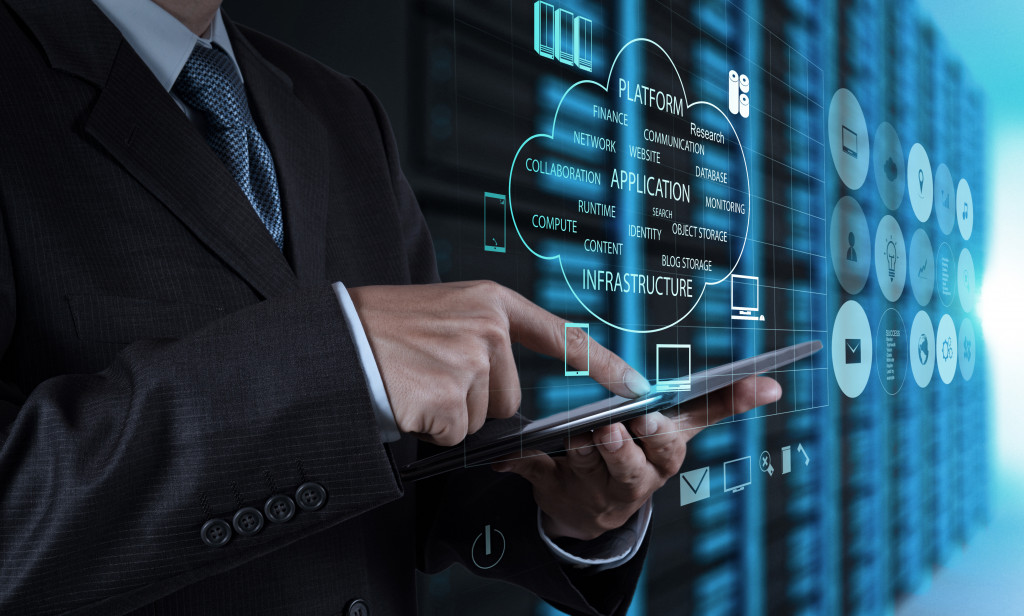- Analytics can provide data on order volumes, delivery times, customer satisfaction levels and other key metrics.
- Cloud computing allows businesses to access software, data storage and other resources over the internet instead of on-site servers.
- Artificial Intelligence (AI) enables machines to learn, reason and problem-solve using data, analytics and algorithms.
- Robotics automates labor-intensive tasks such as sorting and packaging products for shipment.
- Machine learning helps businesses make more accurate predictions and optimize processes.
The use of technology in business has become an integral part of success. Whether for communication, productivity or sales, implementing the right technology can give your business a competitive edge and help you stay ahead. Knowing which technologies are best for your needs can be difficult with so many technologies. To help, this guide has compiled a list of five technologies you should consider utilizing for your business.
1. Analytics
Analytics is a powerful technology that helps businesses understand their customers and identify growth opportunities. Businesses can use analytics to gain insights into customer behavior, preferences, and trends. They can then use these insights to design more effective marketing campaigns, optimize operations, and make better decisions. Analytics can also help businesses measure their performance over time and understand their performance against competitors.
Here are the aspects of your business analytics that can help:
Shipping and logistics
Utilizing reliable shipping analytics allows your business to monitor the performance of its shipping operations. This technology can provide data on order volumes, delivery times, customer satisfaction levels, and other key metrics. You can use this information to identify areas where you may need to improve processes or adjust pricing. It also provides valuable insights into customer needs, allowing your business to tailor your services accordingly. Shipping analytics also help track delivery patterns and forecast future demand, enabling you to allocate resources better.
Marketing
Analytics can be used to measure the effectiveness of your marketing campaigns. You can track how customers engage with your campaigns, understand customer behavior and preferences, find out which channels are most effective for reaching them, identify areas where you could improve your marketing efforts, and analyze competitor strategies to stay ahead of the competition.
Manufacturing
Analytics helps you identify inefficiencies in your production processes, anticipate demand for products and services, optimize inventory levels based on customer needs, and detect any irregularities in the supply chain. This enables you to maximize efficiency and reduce waste.
Transportation
Analytics can help you optimize route planning, track driver performance and safety records, monitor fuel efficiency, and predict demand for different types of vehicles. It also helps identify areas where you can reduce costs while still providing quality customer service. All these insights enable you to improve the overall efficiency of your transportation operations.
2. Cloud Computing

Cloud computing is a technology that allows businesses to access software, data storage, and other resources over the internet instead of on-site servers. This can help businesses save money as they don’t need to purchase and maintain expensive hardware and reduce energy costs. Cloud computing enables businesses to access their data and applications anywhere, anytime. This can make it easier for businesses to stay agile and quickly adapt to changing market conditions.
3. Artificial Intelligence (AI)
Artificial intelligence (AI) is the ability of machines to learn, reason, and problem-solve using data, analytics, and algorithms. AI can help businesses automate processes and make decisions faster and more accurately by providing insights based on large amounts of data. For example, AI-powered chatbots can automatically provide customer service 24/7 and answer complex questions quickly and accurately.
4. Robotics
Robotics is the application of computers to control and automate physical processes. Robotics can automate labor-intensive tasks, such as sorting products or packaging them for shipment. It can also be used in factories to improve production speed, accuracy, and efficiency. By integrating robotics into their operations, businesses can save money on labor costs while improving the quality of their products and services.
5. Machine Learning

Machine learning is a subset of AI that involves computers using algorithms to learn from data without being explicitly programmed. This technology can help businesses make more accurate predictions, improve efficiency, and optimize processes. For example, machine learning can identify patterns in customer behavior and suggest new products or services they may be interested in, improving customer satisfaction and retention.
In Summary
As businesses strive to advance, they must utilize the latest technologies to stay competitive and succeed. The five technologies discussed above are just some many that businesses can use to improve their operations, increase efficiency, reduce costs, and create more growth opportunities. By implementing these technologies, businesses can always be one step ahead of the competition.

